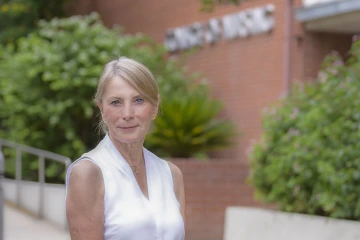Healthy Aging Research to Explore Diabetes, Phishing Scams, Stress and the Aging Brain
Three grants are funding studies to address the diverse needs of an aging population, including treatments and interventions that promote healthy aging.

Three University of Arizona research teams are using seed grants to initiate studies that examine the impact of phishing scams on seniors, stress on the aging brain and using a hormone receptor to regulate diabetes.
Three University of Arizona research teams are using Healthy Aging Seed Grants to initiate studies that will examine the impact of phishing scams on seniors, how stress affects the aging brain, and the potential to regulate diabetes using a hormone receptor. Innovations in Healthy Aging is a strategic priority at UArizona Health Sciences, which funded the projects.

One way to support the Innovations in Healthy Aging is to support research in the field of aging, said Kathleen Insel, PhD, RN, professor at the UArizona College of Nursing.
The U.S. Department of Health and Human Services defines healthy aging as the adoption of healthy habits and behaviors such as staying involved in and supported by one’s community, using preventive services, and managing health conditions and medications, all of which contribute to a productive and meaningful life.
The seed grants will support three innovative research projects:
- The incidence of age-related metabolic diseases driven by fat accumulation in the liver, such as Type 2 diabetes, nearly doubles from the age of 45 to 65. Research on accelerated aging associated with Type 2 diabetes and studies on the enhanced longevity and metabolic health resulting from calorie restriction have largely focused on insulin rather than glucagon, a hormone that works against the action of insulin. Jennifer Stern, PhD, an assistant professor of endocrinology in the UArizona College of Medicine – Tucson, and Benjamin Renquist, PhD, an associate professor in the UArizona College of Agriculture and Life Sciences, will study the effects of enhancing glucagon sensitivity at the liver through caloric restriction with the goal of identifying a novel therapeutic target to promote healthy aging and prevent age-related metabolic disease.
- Robert Wilson, PhD, and Matthew Grilli, PhD, both associate professors of psychology in the UArizona College of Science, will study how the human brain decides whether an email is suspicious and how decision-making processes change with age. Phishing emails are malicious emails that appear legitimate. Phishing email scams have been devastating to older adults, who have more wealth to lose and less opportunity to recover losses than younger adults. Because of the volume of phishing emails and level of deception, technological solutions are only partially effective, leaving human judgment as the main source of defense. Drs. Wilson and Grilli hope to develop cognitive and neurally grounded interventions to reduce phishing susceptibility in older adults.
- Daniela Zarnescu, PhD, a professor in molecular and cellular biology in the UArizona College of Science, will study the cellular mechanisms underlying stress resilience in the aging brain. Dr. Zarnescu will examine the molecular mechanisms behind the assembly and resolution of stress granules, which are formed as a protective measure in response to stress, but which recently have been implicated in age-dependent neurodegerative diseases. Increased stress resilience is associated with positive outcomes in aging, including increased longevity and high physical and cognitive function.
The three research projects are expected to conclude by June 2022.
Contact
Margarita Bauzá
520-621-7246
mbauza@arizona.edu

